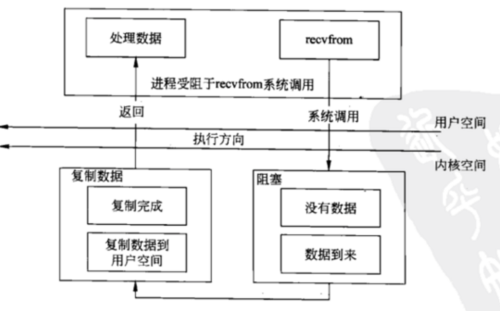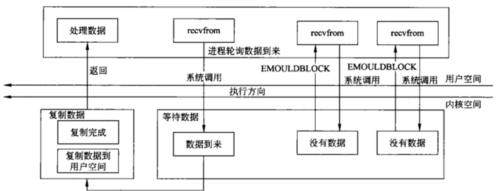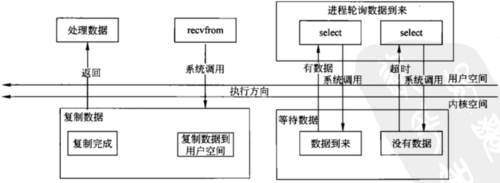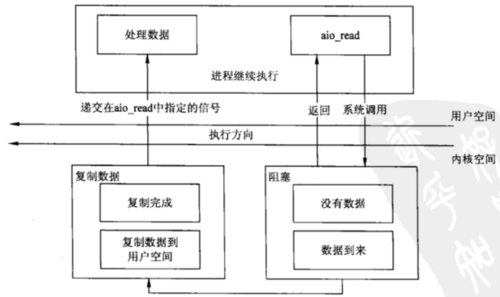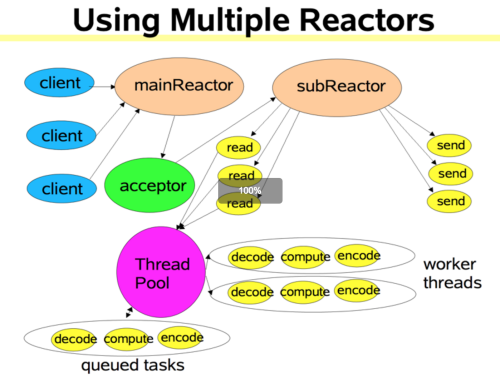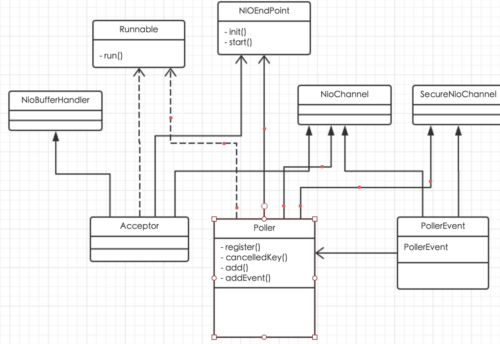概述
看Java NIO一篇文章的時候又看到了“異步非阻塞”這個概念,一直處於似懂非懂的狀態,想解釋下到底什麼是異步 什麼是非阻塞,感覺抓不住重點。決定仔細研究一下。
本文試圖研究以下問題:
web server原理,bio的connector與nio的connector在架構上到底什麼區別?
NIO的優勢到底在哪裏,是如何應用到實踐中的?
同步/異步、阻塞/非阻塞到底是什麼概念,引出的IO模型同步阻塞、同步非阻塞、異步阻塞、異步非阻塞的具體使用場景,適用的場景是怎樣的?
bio nio也只是對內核的封裝,Linux內核的支持是怎樣的?再往下TCP的接口調用、參數的設置是否有異同?
這裏就不浪費篇幅介紹基礎,文中結論是學習、思考的記錄 topic比較大,歡迎討論
1. 數據的IO
1.1 IO模型
“一切皆文件”,Linux對於文件、字符設備、塊設備、socket的訪問都是以抽象爲文件的方式進行。
Linux與Unix都提供了五種IO模型,在參考1 參考2中都涉及:
阻塞IO
非阻塞IO
IO複用
信號驅動
異步IO
但是在實際應用中,二、四很少使用。傳統BIO使用1,Java NIO使用3,JDK7 提供了5的支持。
1.2 Java NIO被稱爲Non-block的疑問
Java NIO使用了事件驅動模型,以Linux爲例 底層通過epoll支持,使用epoll的優點:
避免大量線程阻塞,避免浪費線程資源,避免線程上下文切換浪費CPU資源
打開的fd不受限制(還是受操作系統的限制但進程級不再受限)
IO效率不會隨着fd數目增加而線性下降
使用mmap加速內核與用戶空間消息傳遞
在參考3的最終模型中,稱之爲Non-block
但這裏會造成混淆:
mainReactor、subReactor一直等待事件發生,是阻塞還是非阻塞?
ThreadPool中的worker一直處於wait狀態,event發生收到Reactor的調度會觸發後續操作,是阻塞還是非阻塞?
上面問題的答案貌似是阻塞。那爲何叫這個模型爲非阻塞?
我的理解是阻塞是對應用層而言,應用層並沒有檢測accept、read、write是否完成,而是等待調度所以叫非阻塞。避免應用層檢測的好處上面已經提過 避免過多線程浪費資源、避免上下文切換
1.3 什麼是異步
可以理解爲應用程序調用了io函數後,繼續執行,io操作完成後可以通過回調函數獲取結果。
JDK7加入了對io的異步支持,如下面的例子:
public class Test {
public static void main(String[] args) throws Exception {
AsynchronousChannelGroup group = AsynchronousChannelGroup.withThreadPool(Executors.newFixedThreadPool(10));
final AsynchronousServerSocketChannel server = AsynchronousServerSocketChannel.open(group).bind(new InetSocketAddress("127.0.0.1", 8080));
server.accept(null, new CompletionHandler<AsynchronousSocketChannel, Void>() {
@Override
public void completed(AsynchronousSocketChannel channel, Void attachment) {
server.accept(null, this);
try {
String now = new Date().toString();
ByteBuffer buffer = ByteBuffer.wrap(now.getBytes());
Future<Integer> f = channel.write(buffer);
f.get();
channel.close();
} catch (Exception e) {
e.printStackTrace();
}
}
@Override
public void failed(Throwable exc, Void attachment) {
exc.printStackTrace();
}
});
System.out.println("end........ ");
group.awaitTermination(Long.MAX_VALUE, TimeUnit.SECONDS);
}
}與此類似,使用多線程也可以實現異步。比如訪問數據庫,下游服務等會block主線程的操作,可以放在新的線程中執行。
JDK對異步的支持很早就出現了,JDK5就加入了concurrent包 對於多線程異步的支持:
public class Test {
public static void main(String[] args) throws Exception{
//第一種方式
ExecutorService executor = Executors.newCachedThreadPool();
Task task = new Task();
Future future = executor.submit(task);
executor.shutdown();
System.out.println("task運行結果"+future.get());
}
}
class Task implements Callable<Integer>{
@Override
public Integer call() throws Exception {
Thread.sleep(3000);
int sum = 0;
for(int i=0;i<100;i++)
sum += i;
return sum;
}
}1.4 同步與異步
從上面的說明可以得出結論,實際應用中的IO模型:
同步阻塞:傳統的BIO屬於這種類型
同步非阻塞:使用IO複用(select epoll)。
異步非阻塞:使用AIO,基於回調或者阻塞等待異步操作完成後繼續主程序。
2. Java NIO
2.1 核心概念
Channel
Buffer
Selector
2.2 NIO的優勢
Nio與傳統BIO相比的優勢在於利用了IO多路複用
面向緩衝區
避免資源過高佔用,BIO中等待線程過高會引發兩類問題:一是佔用過多線程資源,二是過多線程導致的上下問切換浪費CPU資源
高併發連接時,性能不會線性下降
epoll可以通過mmap加速內核空間與用戶空間消息傳遞
文件鎖
3. NIO應用
3.1 Tomcat connector
代碼版本:6.0.44
tomcat實現NIOEndPoint提供對NIO的支持
Acceptor內部類實現接受用戶請求
Poller實現對事件的處理
Tomcat的實現代碼中包含不少Fixme註釋,以及異常的特殊處理(捕獲後僅打印堆棧 程序繼續運行)
重點代碼:
NioEndPoint.start()
public void start()
throws Exception {
// Initialize socket if not done before
if (!initialized) {
init();
}
if (!running) {
running = true;
paused = false;
// Create worker collection
if (getUseExecutor()) {
if ( executor == null ) {
TaskQueue taskqueue = new TaskQueue();
TaskThreadFactory tf = new TaskThreadFactory(getName() + "-exec-");
executor = new ThreadPoolExecutor(getMinSpareThreads(), getMaxThreads(), 60, TimeUnit.SECONDS,taskqueue, tf);
taskqueue.setParent( (ThreadPoolExecutor) executor, this);
}
} else if ( executor == null ) {//avoid two thread pools being created
workers = new WorkerStack(maxThreads);
}
// Start poller threads
pollers = new Poller[getPollerThreadCount()];
for (int i=0; i<pollers.length; i++) {
pollers[i] = new Poller();
Thread pollerThread = new Thread(pollers[i], getName() + "-ClientPoller-"+i);
pollerThread.setPriority(threadPriority);
pollerThread.setDaemon(true);
pollerThread.start();
}
// Start acceptor threads
for (int i = 0; i < acceptorThreadCount; i++) {
Thread acceptorThread = new Thread(new Acceptor(), getName() + "-Acceptor-" + i);
acceptorThread.setPriority(threadPriority);
acceptorThread.setDaemon(daemon);
acceptorThread.start();
}
}
}
Acceptor
protected class Acceptor implements Runnable {
/**
* The background thread that listens for incoming TCP/IP connections and
* hands them off to an appropriate processor.
*/
public void run() {
// Loop until we receive a shutdown command
while (running) {
// Loop if endpoint is paused
while (paused) {
try {
Thread.sleep(1000);
} catch (InterruptedException e) {
// Ignore
}
}
try {
// Accept the next incoming connection from the server socket
SocketChannel socket = serverSock.accept();
// Hand this socket off to an appropriate processor
//TODO FIXME - this is currently a blocking call, meaning we will be blocking
//further accepts until there is a thread available.
if ( running && (!paused) && socket != null ) {
//processSocket(socket);
if (!setSocketOptions(socket)) {
try {
socket.socket().close();
socket.close();
} catch (IOException ix) {
if (log.isDebugEnabled())
log.debug("", ix);
}
}
}
}catch (SocketTimeoutException sx) {
//normal condition
}catch ( IOException x ) {
if ( running ) log.error(sm.getString("endpoint.accept.fail"), x);
} catch (OutOfMemoryError oom) {
try {
oomParachuteData = null;
releaseCaches();
log.error("", oom);
}catch ( Throwable oomt ) {
try {
try {
System.err.println(oomParachuteMsg);
oomt.printStackTrace();
}catch (Throwable letsHopeWeDontGetHere){}
}catch (Throwable letsHopeWeDontGetHere){}
}
} catch (Throwable t) {
log.error(sm.getString("endpoint.accept.fail"), t);
}
}//while
}//run
}Poller:註冊、處理事件
public void add(final NioChannel socket, final int interestOps) {
PollerEvent r = eventCache.poll();
if ( r==null) r = new PollerEvent(socket,null,interestOps);
else r.reset(socket,null,interestOps);
addEvent(r);
}
/**
* Processes events in the event queue of the Poller.
*
* @return <code>true</code> if some events were processed,
* <code>false</code> if queue was empty
*/
public boolean events() {
boolean result = false;
Runnable r = null;
while ( (r = (Runnable)events.poll()) != null ) {
result = true;
try {
r.run();
if ( r instanceof PollerEvent ) {
((PollerEvent)r).reset();
eventCache.offer((PollerEvent)r);
}
} catch ( Throwable x ) {
log.error("",x);
}
}
return result;
}
public void register(final NioChannel socket)
{
socket.setPoller(this);
KeyAttachment key = keyCache.poll();
final KeyAttachment ka = key!=null?key:new KeyAttachment();
ka.reset(this,socket,getSocketProperties().getSoTimeout());
PollerEvent r = eventCache.poll();
ka.interestOps(SelectionKey.OP_READ);//this is what OP_REGISTER turns into.
if ( r==null) r = new PollerEvent(socket,ka,OP_REGISTER);
else r.reset(socket,ka,OP_REGISTER);
addEvent(r);
}
public void cancelledKey(SelectionKey key, SocketStatus status, boolean dispatch) {
try {
if ( key == null ) return;//nothing to do
KeyAttachment ka = (KeyAttachment) key.attachment();
if (ka != null && ka.getComet() && status != null) {
//the comet event takes care of clean up
//processSocket(ka.getChannel(), status, dispatch);
ka.setComet(false);//to avoid a loop
if (status == SocketStatus.TIMEOUT ) {
processSocket(ka.getChannel(), status, true);
return; // don't close on comet timeout
} else {
processSocket(ka.getChannel(), status, false); //don't dispatch if the lines below are cancelling the key
}
}
key.attach(null);
if (ka!=null) handler.release(ka.getChannel());
if (key.isValid()) key.cancel();
if (key.channel().isOpen()) try {key.channel().close();}catch (Exception ignore){}
try {if (ka!=null) ka.channel.close(true);}catch (Exception ignore){}
try {if (ka!=null && ka.getSendfileData()!=null && ka.getSendfileData().fchannel!=null && ka.getSendfileData().fchannel.isOpen()) ka.getSendfileData().fchannel.close();}catch (Exception ignore){}
if (ka!=null) ka.reset();
} catch (Throwable e) {
if ( log.isDebugEnabled() ) log.error("",e);
// Ignore
}
}
/**
* The background thread that listens for incoming TCP/IP connections and
* hands them off to an appropriate processor.
*/
public void run() {
// Loop until we receive a shutdown command
while (running) {
try {
// Loop if endpoint is paused
while (paused && (!close) ) {
try {
Thread.sleep(100);
} catch (InterruptedException e) {
// Ignore
}
}
boolean hasEvents = false;
hasEvents = (hasEvents | events());
// Time to terminate?
if (close) {
timeout(0, false);
break;
}
int keyCount = 0;
try {
if ( !close ) {
if (wakeupCounter.getAndSet(-1) > 0) {
//if we are here, means we have other stuff to do
//do a non blocking select
keyCount = selector.selectNow();
} else {
keyCount = selector.select(selectorTimeout);
}
wakeupCounter.set(0);
}
if (close) {
timeout(0, false);
selector.close();
break;
}
} catch ( NullPointerException x ) {
//sun bug 5076772 on windows JDK 1.5
if ( log.isDebugEnabled() ) log.debug("Possibly encountered sun bug 5076772 on windows JDK 1.5",x);
if ( wakeupCounter == null || selector == null ) throw x;
continue;
} catch ( CancelledKeyException x ) {
//sun bug 5076772 on windows JDK 1.5
if ( log.isDebugEnabled() ) log.debug("Possibly encountered sun bug 5076772 on windows JDK 1.5",x);
if ( wakeupCounter == null || selector == null ) throw x;
continue;
} catch (Throwable x) {
log.error("",x);
continue;
}
//either we timed out or we woke up, process events first
if ( keyCount == 0 ) hasEvents = (hasEvents | events());
Iterator iterator = keyCount > 0 ? selector.selectedKeys().iterator() : null;
// Walk through the collection of ready keys and dispatch
// any active event.
while (iterator != null && iterator.hasNext()) {
SelectionKey sk = (SelectionKey) iterator.next();
KeyAttachment attachment = (KeyAttachment)sk.attachment();
// Attachment may be null if another thread has called
// cancelledKey()
if (attachment == null) {
iterator.remove();
} else {
attachment.access();
iterator.remove();
processKey(sk, attachment);
}
}//while
//process timeouts
timeout(keyCount,hasEvents);
if ( oomParachute > 0 && oomParachuteData == null ) checkParachute();
} catch (OutOfMemoryError oom) {
try {
oomParachuteData = null;
releaseCaches();
log.error("", oom);
}catch ( Throwable oomt ) {
try {
System.err.println(oomParachuteMsg);
oomt.printStackTrace();
}catch (Throwable letsHopeWeDontGetHere){}
}
}
}//while
synchronized (this) {
this.notifyAll();
}
stopLatch.countDown();
}
protected boolean processKey(SelectionKey sk, KeyAttachment attachment) {
boolean result = true;
try {
if ( close ) {
cancelledKey(sk, SocketStatus.STOP, false);
} else if ( sk.isValid() && attachment != null ) {
attachment.access();//make sure we don't time out valid sockets
sk.attach(attachment);//cant remember why this is here
NioChannel channel = attachment.getChannel();
if (sk.isReadable() || sk.isWritable() ) {
if ( attachment.getSendfileData() != null ) {
processSendfile(sk,attachment,true, false);
} else if ( attachment.getComet() ) {
//check if thread is available
if ( isWorkerAvailable() ) {
//set interest ops to 0 so we don't get multiple
//invokations for both read and write on separate threads
reg(sk, attachment, 0);
//read goes before write
if (sk.isReadable()) {
//read notification
if (!processSocket(channel, SocketStatus.OPEN))
processSocket(channel, SocketStatus.DISCONNECT);
} else {
//future placement of a WRITE notif
if (!processSocket(channel, SocketStatus.OPEN))
processSocket(channel, SocketStatus.DISCONNECT);
}
} else {
result = false;
}
} else {
//later on, improve latch behavior
if ( isWorkerAvailable() ) {
unreg(sk, attachment,sk.readyOps());
boolean close = (!processSocket(channel));
if (close) {
cancelledKey(sk,SocketStatus.DISCONNECT,false);
}
} else {
result = false;
}
}
}
} else {
//invalid key
cancelledKey(sk, SocketStatus.ERROR,false);
}
} catch ( CancelledKeyException ckx ) {
cancelledKey(sk, SocketStatus.ERROR,false);
} catch (Throwable t) {
log.error("",t);
}
return result;
}
PollerEvent
public class PollerEvent implements Runnable {
protected NioChannel socket;
protected int interestOps;
protected KeyAttachment key;
public PollerEvent(NioChannel ch, KeyAttachment k, int intOps) {
reset(ch, k, intOps);
}
public void reset(NioChannel ch, KeyAttachment k, int intOps) {
socket = ch;
interestOps = intOps;
key = k;
}
public void reset() {
reset(null, null, 0);
}
public void run() {
if ( interestOps == OP_REGISTER ) {
try {
socket.getIOChannel().register(socket.getPoller().getSelector(), SelectionKey.OP_READ, key);
} catch (Exception x) {
log.error("", x);
}
} else {
final SelectionKey key = socket.getIOChannel().keyFor(socket.getPoller().getSelector());
try {
boolean cancel = false;
if (key != null) {
final KeyAttachment att = (KeyAttachment) key.attachment();
if ( att!=null ) {
//handle callback flag
if (att.getComet() && (interestOps & OP_CALLBACK) == OP_CALLBACK ) {
att.setCometNotify(true);
} else {
att.setCometNotify(false);
}
interestOps = (interestOps & (~OP_CALLBACK));//remove the callback flag
att.access();//to prevent timeout
//we are registering the key to start with, reset the fairness counter.
int ops = key.interestOps() | interestOps;
att.interestOps(ops);
key.interestOps(ops);
att.setCometOps(ops);
} else {
cancel = true;
}
} else {
cancel = true;
}
if ( cancel ) socket.getPoller().cancelledKey(key,SocketStatus.ERROR,false);
}catch (CancelledKeyException ckx) {
try {
socket.getPoller().cancelledKey(key,SocketStatus.DISCONNECT,true);
}catch (Exception ignore) {}
}
}//end if
}//run
public String toString() {
return super.toString()+"[intOps="+this.interestOps+"]";
}
}3.2 Jetty NIO
3.3 Netty
編碼解碼:可以定製數據的編碼解碼方式,使用高效的二進制數據。
多協議開發:可以基於http或者私有協議
特性:
0拷貝
異步非阻塞
內存池ByteBuf
主從Reactor
無鎖化的串行設計理念
TCP參數定製
3.4 總結
比較Tomcat、jetty與Netty可以發現,Tomcat、Jetty的connector只是對nio接口的簡單實現,Netty提供了更方便使用的可編程API,提供了更豐富的高級功能。
參考
Unix網絡編程 Volumn1
Linux網絡編程
scale in java
Netty權威指南
Netty系列之Netty高性能之道

